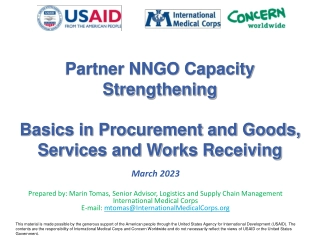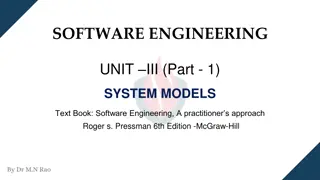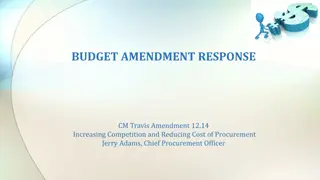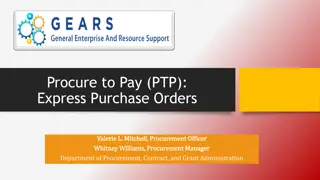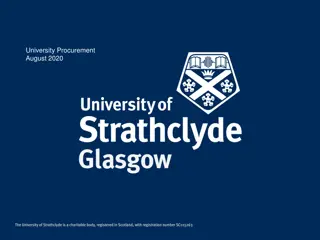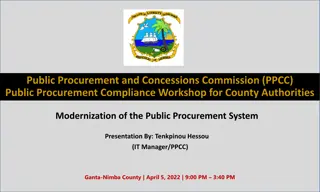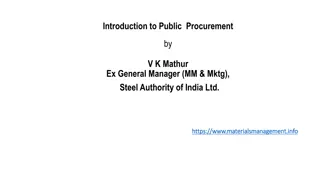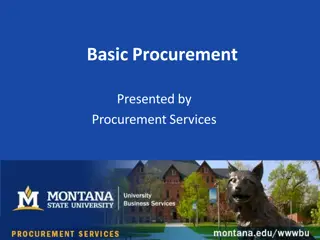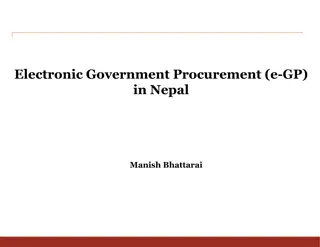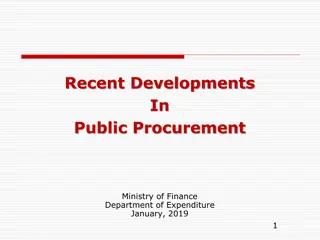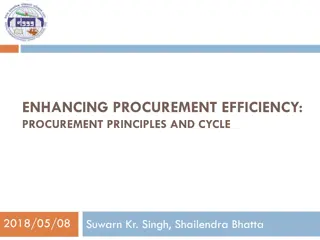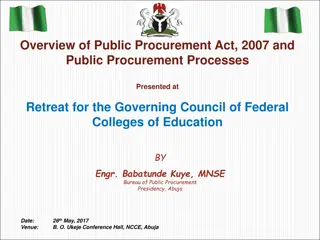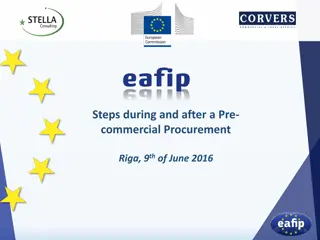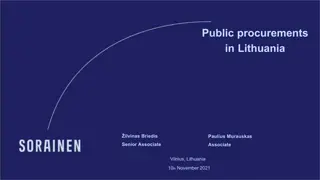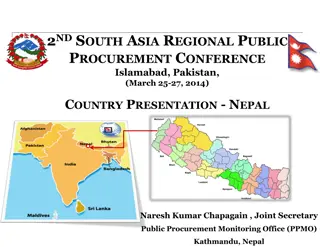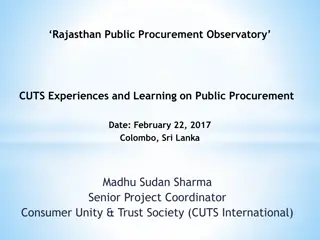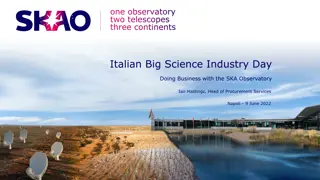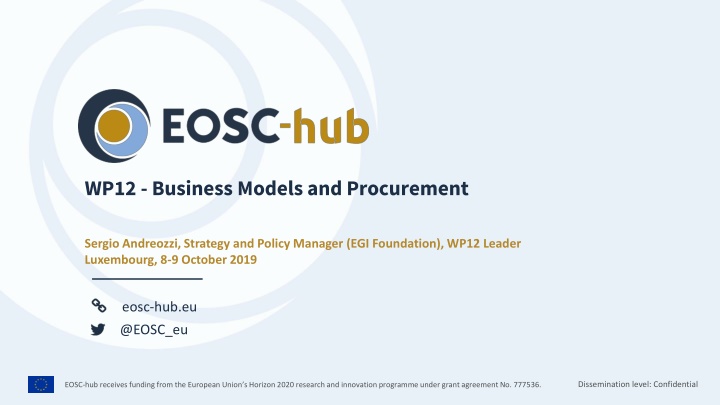
Empowering Research Communities in the EOCS Landscape
Explore the business models and procurement objectives of WP12 in the EOSC context, focusing on market research, collaboration, resource utilization, and future plans. Key exploitable results aim to empower researchers, educate teams, develop the EOSC landscape, and provide services. Market research objectives include understanding current digital service usage, challenges, delivery models, funding streams, and areas for improvement. Join the discussion at the 1st EOSC-hub Review in Luxembourg.
Download Presentation

Please find below an Image/Link to download the presentation.
The content on the website is provided AS IS for your information and personal use only. It may not be sold, licensed, or shared on other websites without obtaining consent from the author. If you encounter any issues during the download, it is possible that the publisher has removed the file from their server.
You are allowed to download the files provided on this website for personal or commercial use, subject to the condition that they are used lawfully. All files are the property of their respective owners.
The content on the website is provided AS IS for your information and personal use only. It may not be sold, licensed, or shared on other websites without obtaining consent from the author.
E N D
Presentation Transcript
Sergio Andreozzi, Strategy and Policy Manager (EGI Foundation), WP12 Leader Luxembourg, 8-9 October 2019 eosc-hub.eu @EOSC_eu Dissemination level: Confidential EOSC-hub receives funding from the European Union s Horizon 2020 research and innovation programme under grant agreement No. 777536.
WP12 Business Models and Procurement Objectives: 1. Analysis Demand-side market research to understand needs of digital services for research Identification of business models to acquire them in the EOSC context 2. Procurement and purchasing framework design and validation Development and piloting of procurement and purchasing frameworks 3. Evaluation and roadmap Evaluation of the experience and definition of a roadmap for future activities Number of Tasks: 3 Number of Participants: 6 Efforts planned RP1: 36PMs 1st EOSC-hub Review, Luxembourg 8-9 Oct 2019
Key Exploitable Results WP12 Researchers and research communities: Empower my research Services in the EOSC Service Portfolio Educate, inform and support my team and community EOSC Hub Operators: Develop the EOSC landscape Service Providers: Provide services for Researchers Rules of Participation EOSC Portal and Marketplace Training courses and materials Internal services in the Hub portfolio Service Management System Business and sustainability models for services and the Hub Interoperability & Integration Guidelines Digital Innovation Hub: platform for industrial collaborations with EOSC Enterprise: Develop, expose and grow my services 1st EOSC-hub Review, Luxembourg 8-9 Oct 2019
Market research Business model analysis Collaborations Use of resources Plans for the second period & deviations 1st EOSC-hub Review, Luxembourg 8-9 Oct 2019
Market Research: Objectives Understand Current usage and foreseen demand of digital services for researchers Current challenges in using/offering digital services Current delivery models Identify Preferred delivery models of digital services for researchers Funding streams and procurement strategies Areas of improvements for business models 1st EOSC-hub Review, Luxembourg 8-9 Oct 2019
Market Research: Target stakeholders Survey organisations that need to acquire/procure digital services in order to serve research communities Organisations serving large organised research communities (e.g. EIRO, Big lab, ESFRI) Private sector / business organisations with significant research focus Public sector organisations with significant research focus Organisations serving small research groups / individuals (e.g. universities, research centres) Scientific-service provider or consumer institutes National Research and Education Networks (NREN) H2020 projects 1st EOSC-hub Review, Luxembourg 8-9 Oct 2019
Market Research: Methodology 3 main roles targeted: Researchers or research managers: to identify user requirements Internal IT service provision & support: to understand how services are delivered Procurement and finance managers: to understand current funding streams and approaches to procurement N=32 N=33 1st EOSC-hub Review, Luxembourg 8-9 Oct 2019
Respondents: Type of Organisations & Location 1st EOSC-hub Review, Luxembourg 8-9 Oct 2019
Services for researchers: usage and challenges (Highlights) Usage - Store/share research data, software or knowledge (data repositories, ~80%) - Discover data and associations with software/publications (data registries, ~60%) - Extract information from data (data analytics, ~60%) - e-infrastructures already being used (~60%), welcome addition (~30%), no need (~10%) Challenges in using/offering services - FAIR principles: researchers vs providers reported divergence in readiness - Data Management Planning needs to be supported - Lack of a complete service and data catalogue for the EOSC - Single Sign-On (also applies to accessing distributed data sources) - Interoperability and integration is a recurring topic (also applied to data) - Free-at-point-of-use for services is expected 1st EOSC-hub Review, Luxembourg 8-9 Oct 2019
Out-/in-sourcing strategic considerations Reasons for not outsourcing: Internal skills development Retention of control (especially over lifecycle) Survival during financial squeezes Risk reduction (buyout, shut down, etc.) Flexibility to integrate into the researcher workflow Low latency and high bandwidth requirements Other: temporal scarcity of resources, combine financial resources 1st EOSC-hub Review, Luxembourg 8-9 Oct 2019
Funding and procurement of outsourced services Funding streams Mainly national/EU public funds (92%), mostly via competitive selection Access policies for offered service Membership-by-affiliation (56%), open/free access (26%), excellence-driven (21%), market-driven (14%) Type of procurement used Open (50%), restricted (40%), negotiated (30%), competitive dialogue (20%) Lead time 1 month -> 1 year; negotiations used by > 80% Other conditions: Standards compliance, geographical location, reliability/availability/quality 1st EOSC-hub Review, Luxembourg 8-9 Oct 2019
Market research Business model analysis Collaborations Use of resources Plans for the second period & deviations 1st EOSC-hub Review, Luxembourg 8-9 Oct 2019
Motivation Use cases Individual researcher acquiring services for limited-scale access - researcher led Organisational unit acquiring services for user base - organisational unit led Lead buyer acquiring services for a consortium - consortium led Forces at play Free at the point of use vs compensation for services rendered Agile procurement vs. compliance in cross-border, many-to-many relationship matrix Economies of scale vs community dynamics Foundations for growth Number of researchers: tens of thousands -> 1.7M -> 70M Complexity: number of communities, international and sectoral aspects Compliance challenge: VAT, GDPR, public procurement rules, 1st EOSC-hub Review, Luxembourg 8-9 Oct 2019
Business model landscape Business model Diversity of transactional patterns Organisational type Voucher/Cloud Coin Researchers Sponsored Use Lead buyer/demand aggregation Organisational Units, departments Organisations and Consortia Organisational granularity 1st EOSC-hub Review, Luxembourg 8-9 Oct 2019
#1: Cloud Coin/Voucher Access Model Considerations - Suitable for limited-scale access to services - Calling off capacity from pre-arranged commercial agreement - Access and accounting mechanism - Previous experiences from the HNSciCloud project, more from collaboration with the OCRE project Benefits - Ease of use - Users are choosers - Providers paid based on use Challenges - Several fundamental regulatory, policy and contractual issues open - Complexity in handling the lifecycle (e.g.: expirations, unused credit) - Scope of eligible providers and users 1st EOSC-hub Review, Luxembourg 8-9 Oct 2019
#2: Sponsored use Considerations Bilateral relationship between an organisation and a service provider - EOSC Portal supports matchmaking, but has no contractual role - Contractual and technical (e.g. AAI) details specific to be organised Benefits - Flexibility in negotiating services and conditions to meet organisational needs - Smoothing the marginal cost function Challenges - Limited economies of scale - Potential vendor lock-in - Complexity: end-user workflow may need to deal with different, provider-specific interfaces 1st EOSC-hub Review, Luxembourg 8-9 Oct 2019
#3: Lead buyer/demand aggregator Considerations - One legal entity represents a consortium to acquire commercial services - Build negotiating power to get preferential terms - Reduce the number of tendering processes needed Benefits - Lead-buyer will have the transaction volume to build competences, visibility and contacts -> efficiency - Simplified procurement for other members - Collective bargain power Challenges - Managing commercial risk - Added value services to be developed 1st EOSC-hub Review, Luxembourg 8-9 Oct 2019
Market research Business model analysis Collaborations Use of resources Plans for the second period & deviations 1st EOSC-hub Review, Luxembourg 8-9 Oct 2019
The evolving EOSC landscape EOSC Governance established and related Working Groups EOSC Sustainability Working Group published a strawman document focusing on financing model, legal vehicle, governance structure, regulatory and policy environment Main milestone: Q3 2020 Recommendations on strategic and financing orientations and organisational settings for the future of the EOSC OCRE project designed and funded Goal: stimulate the adoption of commercial digital services by the European Research community Dedicated budget available to procure Cloud and EO services for research 1st EOSC-hub Review, Luxembourg 8-9 Oct 2019
Contributions to the EOSC sustainability WG Disseminated EOSC-hub D12.1 deliverable - Part of the content referenced in the EOSC Sustainability Strawman document - Minimum Viable Product based on EOSC-hub analysis Feedback on EOSC Sustainability Strawman document - WP12 drafted a feedback that was validated by the EOSC-hub PMB - Key messages: Public good vs. commons Federating core and shared resources Digital marketplaces approach vs. cross-pollination and cross-provider integration Co-existence of publicly-funded services providers vs. commercial service providers Governance model and inclusiveness 1st EOSC-hub Review, Luxembourg 8-9 Oct 2019
Collaboration with the OCRE project Agreed and signed collaboration MoU Aggregate requirements and demand of the research community into a public procurement / tender to establish ready-to-use agreements with capable cloud and earth observation suppliers Support individual institutions and buyer groups to buy cloud resources via dedicated budget Provided feedback to tender requirements Agreed and signed voucher distributions MoU 1st EOSC-hub Review, Luxembourg 8-9 Oct 2019
Market research Business model analysis Collaborations Use of resources Plans for the second period & deviations 1st EOSC-hub Review, Luxembourg 8-9 Oct 2019
WP12: M1-M18 Efforts Planned & Used P1 M1 - M18 WP Task No. Task Name Planned PM Used PM Used% T12.01 Business Model Analysis 30 30 100% WP12 T12.02 Procurement and Purchasing Framework 6.4 1.6 25% WP12 Total 36.4 31.6 87% 1st EOSC-hub Review, Luxembourg 8-9 Oct 2019
Market research Business model analysis Collaborations Use of resources Plans for the second period & deviations 1st EOSC-hub Review, Luxembourg 8-9 Oct 2019
Optimising the Workplan and Impact According to the DoW, T12.2 is expected to Development and piloting of procurement and purchasing frameworks Changes in the landscape The establishment of the new EOSC governance The planned work of the EOSC Sustainability Working Group and strawman document The work defined and being carried out by the OCRE project Re-scoping T12.1 to maximise impact Further development of the identified business models Contribute to forming ToRs for EOSC Central demand aggregators Feed recommendations into EOSC Sustainability WG Interface with OCRE and Archiver projects Collaboration with FAIRsFAIR and EOSC-Synergy projects 1st EOSC-hub Review, Luxembourg 8-9 Oct 2019
Key Results & Success Stories Market research - Methodology & questionnaire defined - Extracted insights from collected data Business models - Identification and high-level analysis of 3 business models EOSC Sustainability WG - Referenced by the EOSC Sustainability WG in the Strawman document - Feedback collected and sent OCRE project - Agreed and signed collaboration MoU and voucher distributions MoU - Provided feedback to tender requirements 1st EOSC-hub Review, Luxembourg 8-9 Oct 2019
Thank you for your attention! Questions? eosc-hub.eu @EOSC_eu

